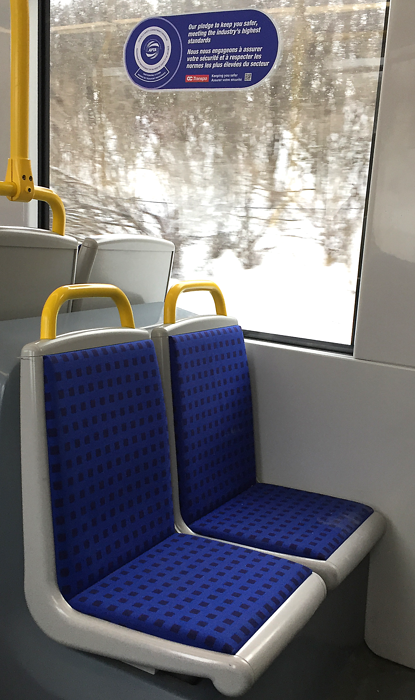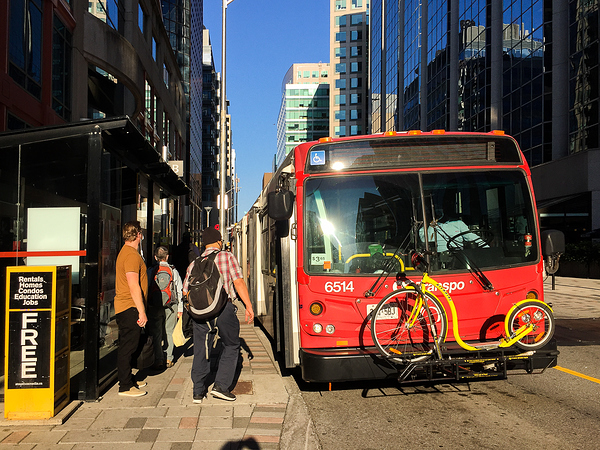Alayne McGregor
If there is any priority on which our current Ottawa mayor and council have dropped the ball, it’s transit.
We have a light rail system that couldn’t meet basic rider demand pre-pandemic, and then repeatedly failed so badly that a provincial commission of inquiry is currently examining why. We have a bus system where dozens of trips were cancelled with almost no notice on a daily basis this summer. Riders have constantly complained about off-schedule and unreliable buses.
And, to top it off, OC Transpo charges some of the highest fares in Canada.
What are the candidates for Ottawa’s mayor planning to do about this? There’s a wide range of ideas, although most candidates espouse improved reliability and a review of OC Transpo operations. The most controversial is fare-free transit.
Catherine McKenney
Catherine McKenney announced their transit platform last week, calling for “reliable transit that people can afford.” They said riding on buses and the LRT should be easier and more convenient and more reliable across Ottawa. “And we need to make our transit as affordable as possible to reduce congestion and everyone’s commute times.”
McKenney proposed:
- freezing transit fares
- expanding free transit to all children and youth ages 17 and under (it’s now free for 7 and under)
- reducing the price of the low-income EquiPass to the same as the Community Pass (from $58.25 to $43.25)
- increasing transit operations (adding trips) by 20 percent over the next four years
- reviewing the entire route system “to ensure transit is serving communities across the city in the most efficient and effective way”
- instigating a top-to-bottom review of OC Transpo in their first 100 days as mayor
- if RTG/RTM is found in default of their contract, bringing the maintenance contract into City control to improve reliability
- investing in Para Transpo and accessible taxi services with funds raised by increasing the accessibility surcharge on rideshare companies (to 20 cents per ride)
- accelerating the electrification of Ottawa’s bus fleet
They said the plan would cost $35 million in 2023: $18 million to increase trips, $14 million to make transit free for youth, $2 million for freezing fares, and $1 million on the EquiPass.
That funding would come from “reallocating existing City spending away from lower priorities,” rather than increasing fares or taxes. They gave “subsidies for Porsche dealerships and the failed P3 deals” for LRT as examples of places to cut.
None of the other candidates proposed transit platforms in this much detail or costed out.

Mark Sutcliffe
Mark Sutcliffe has attacked McKenney for their column in the April issue of The BUZZ, in which McKenney outlined the possible reasons for fare-free transit and called for “a serious talk about how transit is funded and by whom.”
Sutcliffe opposed free transit, saying it would cost “taxpayers millions of dollars. We need more reliable transit, including light rail that works and improved bus service.” He did not specify on his website how he would do this.
Bob Chiarelli
Bob Chiarelli had a similar position, objecting to a city study to investigate the possibility of fare-free transit because of the cost, and emphasizing improving service reliability. On his website, he called the bus system “broken”, and said “it is clear existing management has failed passengers and that he solution is the need for new oversight over our transit system.”
In a radio interview, Chiarelli called for a top-to-bottom review of OC Transpo operations by an outside auditor to look for efficiencies in its management within 100 days of taking office. He also called for focusing on service in neighbourhoods rather than commuting, given many public servants will continue to work from home.
Other candidates
Brandon Bay supported building a light-rail transit loop between Gatineau and Ottawa, and running a rapid transit line to Lansdowne Park. He also called for funding reliable, fare-free transit with parking revenues and in-station retail.
Bernard Couchman supported free public transit.
Graham MacDonald said he is looking for accountability and answers to the current LRT “debacle” from the provincial inquiry. He also called for a financial, ridership, and maintenance audit to ensure the system is running effectively and efficiently. He also recommended inquiries into LRT stages 2 and 3 regardless of the outcome of the inquiry into stage 1.
At press time, Mike Maguire had not yet released his transit options policy.
Ade Olumide proposed introducing 13-seater jitney buses as shuttles to transit stations in both rural and urban areas. He pushed for free transit for those who earning under $53,000/year, and also suggested having the federal government buy transit passes for all its employees and using the proceeds to fund free transit. He recommended OC Transpo give weekly performance reports on large number of measures including late or canceled trips, ridership, and maintenance.
Param Singh’s platform included the establishment of a “Transit System Review Committee composed of experts to review the city’s existing transit issues with the aim of providing practical recommendations to make our transit system safe, and reliable, and affordable.” He also suggested reducing the price of the low-income EquiPass.
The websites of Nour Kadri, Celine Debassige, and Gregory Jreg Guevara did not mention transit. Zed Chebib and Jacob Solomon did not have websites.

